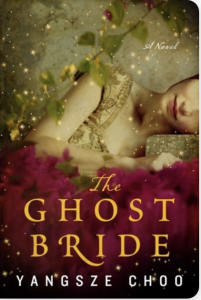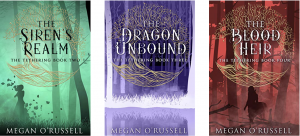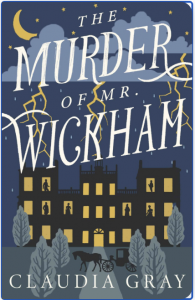C.A. Gray's Blog, page 24
November 20, 2022
The Tipping Point

The post The Tipping Point appeared first on C.A. Gray.
The Golden Compass

The post The Golden Compass appeared first on C.A. Gray.
November 18, 2022
Review of The Awakened Brain

I don’t entirely know what to make of this book.
It was recommended to me by one of the founders of Pray.com to describe the importance of spirituality to mental health, and it did indeed make that point, from a scientific point of view. Yet it also blended data from large-scale studies and imaging demonstrating patterns of the brain awakened to spirituality with the author’s own spiritual experiences–and these were what confused me a little. I don’t doubt her experiences, and the coincidences she called “synchronicity” probably were God speaking to her and guiding her (though the author doesn’t really attribute these things to God per se, nor to any one cognizant entity). We’ve all had experiences like this, if we’re aware enough, I’d venture to say–and so, I think, would she.
At the same time, using such experiences as guidance I believe is fraught with danger. The book is intended to be spiritual, not religious, and supports any form of spirituality as a path to the benefits found in their studies, which I can well believe. While I believe that Jesus is THE way, the truth, and the life, I’m also reminded of C.S. Lewis’s “The Last Battle,” when servants of Tash found that they were in fact serving Aslan all along, though they called Him by a different name. I’m sure that we’ll be surprised by some of the people whom God counts as His own, in the end (and some whom He doesn’t. Scripture tells us as much.)
Miller’s perspective, though, doesn’t seem to account for the possibility of any spiritual malevolence that might have access to the exact same kinds of physical guidance, or a person’s own distorted (or even evil) worldview taking moments of synchronicity and drawing harmful conclusions. I’ve heard, and probably we’ve all heard, plenty of stories exactly like this, where someone makes a terrible life choice because of a coincidence that seemed like spiritual guidance. I think this is the very reason why, since the Holy Spirit came, His leading and scripture itself are the primary way God leads His kids. It’s the only thing that can’t be counterfeited. Sure, God can use the physical realm to get through to us, and He does sometimes (I believe on rare occasions, and usually for those who don’t have the Holy Spirit already). But so can Satan. And then there’s the complication of our own confused minds, which can invent meaning out of nearly anything to suit our own preconceived ideas. (I did a podcast on this topic, sort of, on my other podcast, Christian Natural Health, here.)
So while the examples she gives in the book are all beautiful, they seem like cherry-picking. Using anomalous events and whatever thoughts pop into one’s mind as one’s primary means of guidance for major life choices seems potentially very dangerous.
My rating: ***Language: noneSexual content: noneViolence: nonePolitical content: noneThe post Review of The Awakened Brain appeared first on C.A. Gray.
November 17, 2022
test
Test Book
Lorem ipsum dolor sit amet, consectetuer adipiscing elit. Donec odio. Quisque volutpat mattis eros. Nullam malesuada erat ut turpis. Suspendisse urna nibh, viverra non, semper suscipit, posuere a, pede.
Donec nec justo eget felis facilisis fermentum. Aliquam porttitor mauris sit amet orci. Aenean dignissim pellentesque felis.
Morbi in sem quis dui placerat ornare. Pellentesque odio nisi, euismod in, pharetra a, ultricies in, diam. Sed arcu. Cras consequat.
Praesent dapibus, neque id cursus faucibus, tortor neque egestas auguae, eu vulputate magna eros eu erat. Aliquam erat volutpat. Nam dui mi, tincidunt quis, accumsan porttitor, facilisis luctus, metus.
Phasellus ultrices nulla quis nibh. Quisque a lectus. Donec consectetuer ligula vulputate sem tristique cursus. Nam nulla quam, gravida non, commodo a, sodales sit amet, nisi.
November 11, 2022
Review of The Ghost Bride
 This is definitely an original concept, though I found it somewhat hard to follow (on audio anyway).Li Lan is a young Chinese girl whose mother died young, and her impoverished father, struggling to find a husband who can provide for her, one day jokingly asks if she’d like to be a “ghost bride.” This is what it sounds like, and I very much appreciated the author’s “afterword” after the story, explaining the cultural practice. It was very rare, even in Chinese culture, she said, but when it did occur, it typically was when the pair were already in love when one of them passed away, in order to grant rights of a widow to the surviving partner. In this story, however, the offer is from the wealthy family of a deceased son, to grant Li Lan residence in their wealthy home for the rest of her life. She’s not surprisingly horrified by the idea, as it would mean that she’ll never have love or children of her own. Her father only mentioned it half jokingly anyway, because it seems that the marriage he had been attempting to arrange for her (ironically with the cousin of the deceased) had fallen through.But this is where the story turns supernatural. The ghost, whose name doesn’t stick in my mind, saw Li Lan during his life and desired her, and visits her in her dreams. But he’s not only dead, he’s also revolting (reminds me a bit of Beetlejuice). Meanwhile, Li Lan meets Tian Bai, her would-be husband and cousin to the dead suitor, and falls for him instead. In order to exercise her undead suitor, Li Lan visits a medium, obtains some herbs that should keep him from visiting her in her sleep, and then overdoses on them–at which point she herself hovers somewhere between life and death. In this suspended state, she travels through the realms of the dead, learning what she can about the hold the dead suitor has over her, and… this is kind of where I got lost. I wasn’t very clear on what it was that she was trying to accomplish in the land of the dead, though it was all very fantastical and creative.There was a bit of a twist ending, though it wasn’t a huge shocker–we’d been rather set up for it. I don’t think it could really have ended any other way.My rating: ****Language: noneSexual content: noneViolence: noneWoke content: none
This is definitely an original concept, though I found it somewhat hard to follow (on audio anyway).Li Lan is a young Chinese girl whose mother died young, and her impoverished father, struggling to find a husband who can provide for her, one day jokingly asks if she’d like to be a “ghost bride.” This is what it sounds like, and I very much appreciated the author’s “afterword” after the story, explaining the cultural practice. It was very rare, even in Chinese culture, she said, but when it did occur, it typically was when the pair were already in love when one of them passed away, in order to grant rights of a widow to the surviving partner. In this story, however, the offer is from the wealthy family of a deceased son, to grant Li Lan residence in their wealthy home for the rest of her life. She’s not surprisingly horrified by the idea, as it would mean that she’ll never have love or children of her own. Her father only mentioned it half jokingly anyway, because it seems that the marriage he had been attempting to arrange for her (ironically with the cousin of the deceased) had fallen through.But this is where the story turns supernatural. The ghost, whose name doesn’t stick in my mind, saw Li Lan during his life and desired her, and visits her in her dreams. But he’s not only dead, he’s also revolting (reminds me a bit of Beetlejuice). Meanwhile, Li Lan meets Tian Bai, her would-be husband and cousin to the dead suitor, and falls for him instead. In order to exercise her undead suitor, Li Lan visits a medium, obtains some herbs that should keep him from visiting her in her sleep, and then overdoses on them–at which point she herself hovers somewhere between life and death. In this suspended state, she travels through the realms of the dead, learning what she can about the hold the dead suitor has over her, and… this is kind of where I got lost. I wasn’t very clear on what it was that she was trying to accomplish in the land of the dead, though it was all very fantastical and creative.There was a bit of a twist ending, though it wasn’t a huge shocker–we’d been rather set up for it. I don’t think it could really have ended any other way.My rating: ****Language: noneSexual content: noneViolence: noneWoke content: noneThe post Review of The Ghost Bride appeared first on C.A. Gray.
November 3, 2022
Review of The Wendy

There was so much potential here.
I love retellings in general, and this one started out so creative, with such a whimsical and compelling narrative voice. Wendy is an orphan herself, living in Britain during the Golden age of piracy. She’s always dreamt of being a sailor, but, alas, she’s a woman. (And, here’s where the wokeness comes in. It didn’t take long, and it’s interwoven throughout the story.) ON and ON she goes about how she’s “only” a woman, and therefore no man expects her to know anything, or to be able to fight, or to do anything but raise babies. But Wendy is determined, and a series of unlikely events transpire to give her the opportunities she desires… unfortunately, on Captain Hook’s ship, though she doesn’t know it’s unfortunate at the time.
John and Michael are not her brothers, but two soldiers who have trained with her and who both are vying for her attention (because she’s gorgeous and adorable and basically every man who meets her worships her, even though she doesn’t give any of them the time of day. And she knows it, too.) Peter and the Everlost are almost mythical, and they’re villains to Wendy’s knowledge at first, swooping in and stealing children from their beds, and killing and maiming in their pleasure. At first Wendy believes that she’s doing good to help Hook find them and capture or kill them, though it’s hard for her to trust anything Hook says once she meets him and discovers how patronizing he is to her (because again, she’s “just a woman.”) After a few interactions with Peter, though, Wendy is intrigued by the fact that not only he, but also his entire ship can fly–and she also has begun to believe that there is another side to the story about him and the Everlost than what she’s always heard.
They completely lost me when ***spoiler alert*** Wendy betrays Peter to Hook. She thinks she has a really good reason, and she feels really guilty about it, and it doesn’t turn out nearly as poorly as it might have, but it didn’t matter. I was already on the fence about whether I even liked Wendy or not. After that, I decidedly didn’t, and while I finished the story, I won’t read on. Bummer, because really, the narrative voice is so engaging, and the story had a lot of potential too.
My rating: ***1/2
Language: none
Sexual content: none
Violence: fantasy only
Woke content: heavy
The post Review of The Wendy appeared first on C.A. Gray.
October 28, 2022
Review of The Tethering Books 2-4

Review of The Siren’s Realm:
I loved the first book in this series and raced on to this one, eager to know what happened next for Jacob and Emilia. But I think this was one of those series where the premise was better than the execution–and the first book was pretty much all premise and setup for the series. What intrigued me from that point on was mostly the interaction between Jacob and Emilia, and the magical world they lived in, but not really the specifics of it.
In this story, the children of the Gray clan (Jacob, Emilia, Claire, and Connor) go to live in the forest with the centaurs, where they learn magical dueling. Emilia encounters an elderly centaur, who stirs in her the desire to find her mother. Claire is a 13-year old computer hacking prodigy, and she told Emilia that her mother was named Rosalie (while her father is the Pendragon, as we learned in the last book… so basically, Voldemort.) Rosalie and the Pendragon (Emil LeFay) are “tethered” in the same way that she and Jacob are tethered, so the only way Rosalie could actually get away from him without him knowing exactly where she was, was to flee into the Siren’s Realm: a magical alternate world reachable by jumping off of Cadillac Mountain in Maine (which was fun, since I’ve been there at sunrise.) But it’s a dangerous place, full of magical transactions which can keep one stuck forever, if you’re not careful. While there, Jacob wrestles with the question of whether Emilia truly loves him, or whether she’s just stuck with him since they got themselves tethered on accident. I thought they’d let that question hang longer for the sake of the tension, since there were two more books in the series, but it basically got resolved in this one.
My rating: ****
Review of The Dragon Unbound
Dexter, Emilia’s boyfriend who betrayed them in the first book, returned to the story repentant in this one. There was potential there for something interesting to transpire, but he became a very flat character, as did the others’ reaction to him. He wanted their forgiveness, and they refused to give it. His return created a brief moment of tension between Emilia and Jacob again, in which Jacob once again questions whether she loves him. A magical contrivance allows him to learn (again) that, in fact, she does. But it lacked the impact this time around, because we’d essentially already been through that in the last book.
It also started to become very apparent to me that none of the characters were especially memorable except for Emilia and Jacob, and really the only thing interesting about them was how they felt about each other. Now that that was well established, it started to get sappy. Claire is one-dimensional too: she never says anything that isn’t snarky. The rest of the characters were just names, more or less. There was a chapter end when the mage who betrayed them all was revealed, and it was clearly supposed to be a big reveal. It fell totally flat for me, as I couldn’t even remember who this person was.
Perhaps because these books were so short, I decided to go ahead and finish the series anyway…
My rating: ***
Review of The Blood Heir
It’s rare that I finish a book that I enjoyed so little, but I’d come this far in the series. The finale felt almost like a rough draft. The kids go to the magical academy at last, which is basically Hogwarts once Umbridge is in control, but without the humor. They get ready for a war with the Pendragon, which is a recapitulation of the Battle of Hogwarts. Battle scenes were essentially just spells, and characters shouting each others’ names in angst. Several characters died, which was clearly supposed to have the emotional impact of the loss of Sirius or Dumbledore, but I either couldn’t remember who they were at all, or knew the name but was never made to care about them. The Pendragon is evil for the sake of being evil, and he and all the other dragons spout platitudes more or less on the level of “and now you will die!” All the dialogue was very “on the nose,” really. Emilia and Jacob became rather nauseating.
I normally listen to books on 1.8 speed; I sped this one up to 2 just to finish it faster, which didn’t take very long because they’re all quite short. Again, the series had a good premise, and might have been wonderful had it not so clearly mimicked Harry Potter, and had there been a lot more interesting characterization.
My rating: **
For the series:
Sexual content: none
Violence: I think there was still some torture in this one, though it didn’t traumatize me or anything
Language: I believe there were a few words here and there
Woke content: none
The post Review of The Tethering Books 2-4 appeared first on C.A. Gray.
The Unseen Heir by Kenley Davidson
Today’s podcast comes from this blog review of The Unseen Heir.
The post The Unseen Heir by Kenley Davidson appeared first on C.A. Gray.
October 21, 2022
I Capture the Castle, Dodie Smith
Today’s podcast review comes from this blog review of I Capture the Castle.
The post I Capture the Castle, Dodie Smith appeared first on C.A. Gray.




